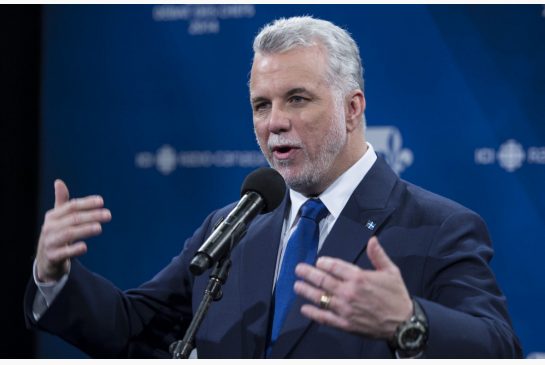Amid the jubilation of the Liberal majority win in Quebec, let’s not forget that the divisive charter of secular values is not quite dead.
Philippe Couillard promised, and reconfirmed at his post-election news conference, that he would introduce his own charter. It, too, would ban religious clothing and symbols in the public sector, albeit for a limited number of people — those occupying “positions of authority,” yet to be defined by him.
The big relief is that he would, as promised, spare the health sector, schools and daycare centres. No one wearing a kippa or a hijab or a turban there would be fired.
He has also confirmed his emphatic no to the face-covering niqab. Those receiving a public service would have to uncover their face.
That’s the easy part.
His challenge is to untangle the knots that he has tied himself in by caving in to the prevailing orthodoxy that religious clothing compromises state neutrality and that it denotes fundamentalism/extremism/militancy.
The idea that senior civil servants eschew religious clothing came from the 2007-08 commission on reasonable accommodation. It suggested the speaker and deputy speaker of the National Assembly as well as police officers, prosecutors, judges and jail guards for the ban.
Couillard agreed — except that he has refused to say whether he’d outlaw the hijab for police officers.
While he ponders that, the real issue is that this entire proposition is as fundamentally flawed and odious as the PQ’s.
Charles Taylor, co-chair of the accommodation commission, has distanced himself from it. He told me last fall that the idea was floated only as “a way out” of the then prevailing anti-minority hysteria (fanned mostly by the sensationalist media of Pierre Karl Peladeau, now an elected Parti Québécois member of the National Assembly, whose partner Julie Snyder has been a proud member of the pro-charter Janettes, named after Janette Bertrand, the 89-year-old TV personality whose xenophobia proved so embarrassing for the PQ).
Couillard campaigned for individual freedom — “it protects us all against oppression, including the oppression of the majority over the minority.” Yet he now wants to discriminate against minority members who exercise their religious freedom through clothing.
He had argued that “there’s not a single shred of data that justifies the charter project.” Equally, there’s no evidence that a kippa- or turban- or hijab-wearing judge is incapable of delivering fair justice.
Couillard would have been better off with his original stand — the PQ charter would pass “over my dead body.” But then he lost his nerve, and kept compromising.
He said Tuesday he now wants to define the concept of the neutrality of the state. But he has already defined it in the worst way, by conceding that it depends, in part, on barring some citizens from holding certain key positions. He is skating on PQ ice.
When he presents his charter, both the Parti Québécois and Coalition Avenir Québec are likely to find it wanting. The PQ leadership hopefuls, Peladeau, Jean-Francois Lisee and Bernard Drainville, in particular, would want to go to town on the only issue left for them to rally their troops on.
Irony is that the premier-elect stands compromised on the very issue that Quebecers have soundly rejected — defeating not only the PQ government but the charter’s chief architect, Marois, in her own riding, and the five militantly pro-charter women she had backed it (including four Muslim and one Jewish), each full of contradictions and wild conspiracy theories against Muslims and Jews.
Had Couillard taken a principled position, he would now have had the golden opportunity to put an end to all the anti-Semitic, anti-Islamic and anti-Sikh nonsense that has been peddled in the name of secularism.
Another of his mistakes was to accept that hijab equals militancy. He formed a Liberal panel to study “fundamentalism,” including the radicalization of young people. To mitigate the proposal’s Islamophobic undercurrent, he said the panel would also tackle Christian fundamentalists who won’t have their children vaccinated. That’s a matter for public health authorities, as jihadism is for police, to tackle, not politicians pondering basic rights and freedoms.
The premier-elect made it worse Tuesday by elevating his internal party proposal into the broad official quest for consensus on the charter — “to prevent certain manifestations of fundamentalism.”
He should deep-six that, and concentrate instead on ways to get out of the deeper quagmire he has got himself into — and do it before his honeymoon runs out and identity politics rears its ugly head again.
Haroon Siddiqui’s column appears on Thursday and Sunday. hsiddiqui@thestar.ca






























Laissez un commentaire Votre adresse courriel ne sera pas publiée.
Veuillez vous connecter afin de laisser un commentaire.
Aucun commentaire trouvé